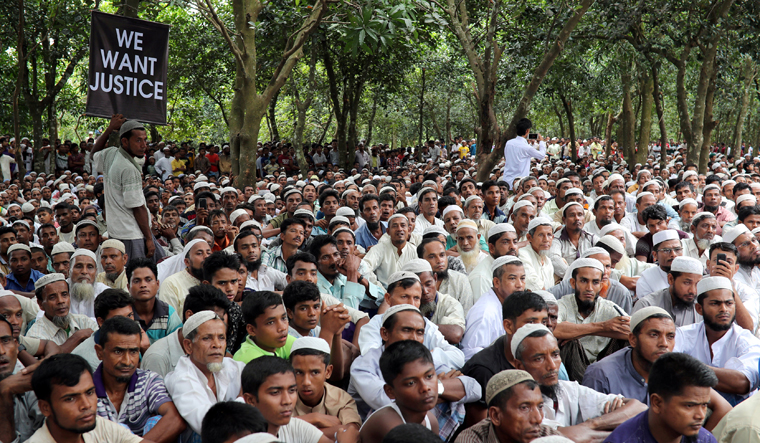On Sunday, Myanmar officials announced that they were ready to receive more than 2,000 Rohingya Muslims who had fled to Bangladesh in fear of violence.
The country will receive the first batch of Rohingya Muslims this week and around 2,000 Rohingyas will be moved back in the first batch under a deal between the neighbours struck last month.
Minister of Social Welfare, Relief and Resettlement Win Myat Aye announced at a news conference that Bangladesh had informed Myanmar authorities that repatriation, agreed upon in principle months ago, would begin on Thursday.
Noting that the actual date depended upon Bangladesh taking action, Win Myat Aye said, "Whether it will happen on the day or not, we have to be ready on our side and we try our best to do that." Noting that the actual date depended upon Bangladesh taking action, Win Myat Aye said, "Whether it will happen on the day or not, we have to be ready on our side and we try our best to do that."
But, there is still uncertainity regarding the safety of the Rohingyas in Myanmar as Buddhists have been protesting against the repatriation. Fearing more violence, around 20 individuals who are on the first list have said they are not willing to move.
The United Nations also says conditions are not yet safe for their return. The UN's refugee agency said late on Sunday that Rohingya refugees should be allowed to go and see the conditions in Myanmar before they decide to go back.
The Rohingya exodus began after Myanmar security forces launched a brutal crackdown following coordinated insurgent attacks in August 2017.
The scale, organisation and ferocity of the operation led to accusations from the international community, including the United Nations, of ethnic cleansing and genocide. Myanmar's government has denied this.
According to Sunday's Myanmar government statement, the returning Rohingya would stay at repatriation camps for two days and receive food and clothing before moving on to transit camps.
It said China, India and Japan were "providing necessary assistance" for the repatriation process, but did not give details.
It isn't clear how long the returnees would have to stay in the transit camps or where they would go afterward, as many Rohingya villages have been erased by bulldozers, with the land given to local Rakhine Buddhists.
Officials said Sunday that returnees can get an ID document called a National Verification Card that will allow them to travel anywhere in the Maungdaw area of Rakhine State.
They can then begin to apply for citizenship.
But there is widespread skepticism that any returning refugees will ever be granted citizenship.
Seeking a voluntary, safe and dignified return of Rohingya refugees from Bangladesh to Myanmar, the US asserted that Dhaka must ensure that the returnees have the freedom of movement and "not be confined to camps".
"We have engaged both governments at the highest levels to express our serious concerns about premature returns, and to emphasize that, consistent with international practice, returns be informed, voluntary, safe, and dignified. Further, returnees to Burma must have freedom of movement and not be confined to camps, the US State Department said in a statement on Sunday.


